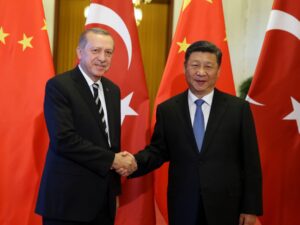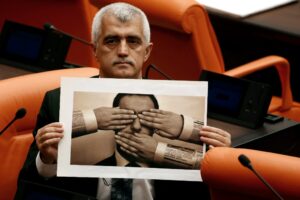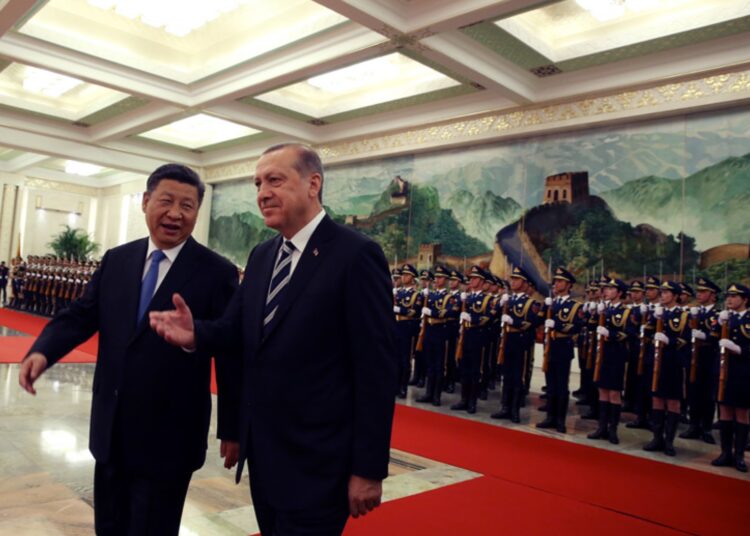Abdullah Bozkurt/Stockholm
The Turkish opposition accused President Recep Tayyip Erdogan’s government of accepting hush money from China in exchange for downplaying the extensive human rights violations against the Uyghur population in Xinjiang, China’s northwestern province.
The accusations leveled against the Erdogan government during a debate in the Turkish Parliament on May 9 occurred when the opposition submitted a motion to hold a special general assembly. The purpose of the meeting was to recognize the events in the Xinjiang region, referred to as Eastern Turkistan in Turkey, as genocide perpetrated by the Chinese state.
The motion was similar to those adopted by many of Turkey’s Western allies’ parliaments. However, it was rejected with the majority vote of Erdogan’s ruling Justice and Development Party (AKP) and its far-right ally, the Nationalist Movement Party (MHP).
The motion, presented on May 9 by the Saadet (Felicity) Party and endorsed by others in the opposition bloc, was rejected the same day after a brief debate and exchange of harsh remarks among lawmakers in the general assembly.
Mahmut Arıkan, a lawmaker from Kayseri, said, “Since the establishment of the People’s Republic of China, a total of 35 million of our Uyghur brothers and sisters in East Turkestan have been killed.” He accused China of running concentration and forced labor camps, suppressing religious practices, carrying out political brainwashing and implementing forced sterilization against Uyghurs.
Minutes from the debate on China in the Turkish Parliament:
“Dear friends, opposing the persecution in East Turkestan is standing up for human dignity. By acting together and raising our voices together, we can put an end to this persecution. Remaining silent against this genocide is a betrayal of humanity. We, our Parliament, have an obligation to be a voice for the freedom of East Turkestan,” he added.
Buğra Kavuncu, a lawmaker from Istanbul, said the atrocities in Xinjiang have escalated into a genocide, with the fate of hundreds of thousands remaining unknown. He claimed that China has more influence in Turkey than is commonly thought and funds entities that promote China’s propaganda.
He targeted pro-China circles in Turkey, stating that some turn a blind eye to the humanitarian atrocities in Xinjiang under the pretext of opposing Western imperialism. “In Turkey, some circles accuse you of being pro-West, of being servants to certain circles if you speak out against the persecution in East Turkistan. The real servants are those whose strings are pulled by China,” he said.
Ömer Faruk Gergerlioğlu, an opposition lawmaker and prominent human rights defender, said the Erdogan government has distanced itself from the prospect of EU membership and democracy as it has become closer to China, trying not to upset or offend Beijing. He accused the government of making agreements with China while 5 million Uyghurs face genocide.
He also highlighted China’s delaying tactics regarding the planned visit by a Turkish delegation to the Xinjiang region, as agreed upon in July 2019 during Erdogan’s trip to China. He claimed that China bought Turkey’s silence with a $50 billion deal involving investments, swap exchanges and trade and commercial interests.

“It’s been four and a half years; the Human Rights Committee of this Parliament was supposed to go to China, visit the concentration camps, collect information. It didn’t happen. Genocide has been recognized in many parliaments around the world, but the Turkish Parliament, the AKP and the MHP bury their heads in the sand to avoid seeing them. Why? The reason is the $50 billion deal of July 2019,” he remarked.
Defending the government’s record on China, lawmaker Abdulkadir Emin Önen, the former ambassador to China from the ruling AKP, said the government is very sensitive to the plight of Uyghurs in Xinjiang but is not ready to publicly disclose what actions it has been taking behind closed doors.
Leyla Şahin Usta, who defended the government’s position on China, revealed that Beijing has not yet approved the planned visit by a Turkish delegation as agreed in 2019.
The visit was discussed during Erdogan’s meeting with Chinese President Xi Jinping on July 2, 2019, where President Xi proposed the idea of Turkey sending a delegation to Xinjiang. On July 24, 2019, the Chinese ambassador to Turkey formally conveyed the official invitation. However, the delegation, to be composed of approximately 10 participants from various Turkish institutions, was never formed, and the details of the planned visit have been a subject of controversy between Turkish and Chinese officials.
When asked in parliament about the fate of the visit in January 2020, then-deputy foreign minister Yavuz Selim Kıran said, “We are in the process of preparing a delegation to send to China, but we also want this delegation to have the opportunity to observe certain locations and points that we have mutually agreed upon with China, in order to accurately assess the situation on the ground. Our consultations with China on this matter are ongoing.”
The Erdogan government has developed closer relations with China, especially as Turkey’s ties with its NATO allies and Western partners have been troubled on several issues, including but not limited to human rights violations and the suspension of the rule of law in Turkey. Ankara elevated Turkey’s relations with China to the level of strategic cooperation in 2010 and joined China’s Belt and Road Initiative in 2015.
According to Turkish government statistics, as of February 2024, 1,282 Chinese companies are operating in Turkey, with total foreign direct investment reaching $1.2 billion. This investment is substantially lower compared to what Turkey has received from its Western allies. In 2023 the trade volume between Turkey and China exceeded $45 billion, heavily favoring China. Turkey imported $45 billion worth of goods from China last year, while exporting only $3.3 billion to China.

The Turkish Central Bank also signed a currency swap agreement with the People’s Bank of China on May 30, 2019, aiming to increase trading in local currencies. Under this agreement, the swap arrangement was set at 46 billion Turkish lira and 35 billion Chinese yuan.
Although a number of Turkey’s NATO allies have condemned China for human rights violations in the Xinjiang region, branding them as crimes against humanity and genocide, Turkey has refrained from joining the chorus. Many resolutions brought to the Turkish Parliament’s agenda by the opposition to condemn China were defeated by Erdogan’s ruling party and its allies, which constitute the majority in the people’s house.
In January 2021 the US State Department determined that China has committed genocide and crimes against humanity by violating the rights of the predominantly Muslim Uyghurs and other members of ethnic and religious minority groups in Xinjiang since at least March 2017. These crimes included the arbitrary imprisonment or other severe deprivation of physical liberty of more than 1 million civilians, forced sterilization, torture of a large number of those arbitrarily detained, forced labor and the imposition of draconian restrictions on freedom of religion or belief, freedom of expression and freedom of movement.
A number of Western countries followed suit, condemning China for genocide against the Uyghurs. In February 2021 Canada’s House of Commons voted overwhelmingly to declare China’s treatment of its Uighur minority population a genocide. In April 2021 British MPs voted to declare that China is committing genocide against the Uyghur people. In June 2022 the European Parliament adopted a resolution stating that China’s treatment of mostly Muslim, Turkic-speaking indigenous ethnic groups, such as Uyghurs, Kazakhs and others in the northwestern region of Xinjiang, amounts to “crimes against humanity” and holds a “serious risk of genocide.”
In August 2022 the United Nations Office of the High Commissioner for Human Rights (OHCHR) released a report stating that it found significant evidence that Beijing is committing crimes against humanity. Activists and UN rights experts say that over 1 million Uyghurs have been imprisoned in what were called “re-education centers” and subjected to forced labor, torture, rape and sterilization.












